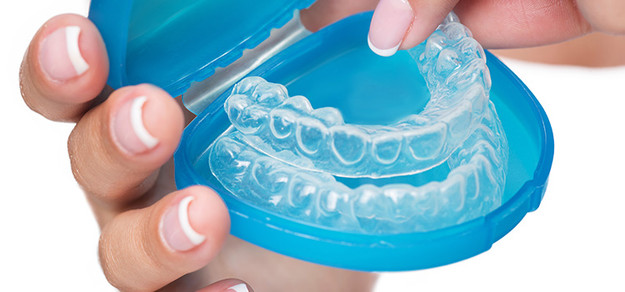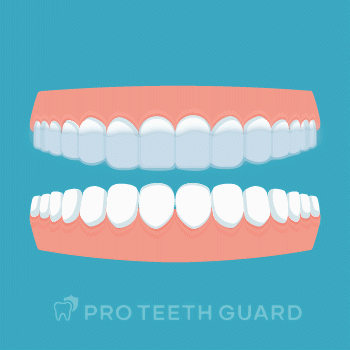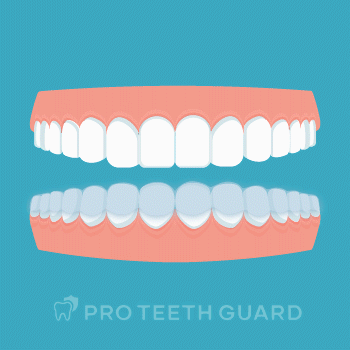Upper or Lower Night Guard
9th Aug 2025

If you grind or clench your teeth at night, you’re not alone. This condition—called bruxism—can wear down your teeth and lead to jaw pain, headaches, and even TMJ issues over time.
Wearing a night guard is one of the best ways to protect your teeth while you sleep. But should it go on your upper or lower teeth?
In this article, we’ll explain the differences between upper and lower night guards, their pros and cons, and how to choose the one that fits your needs best.


Choosing a Dental Night Guard: Upper or Lower Night Guard
When it comes to picking an upper or lower dental night guard, the best choice depends on what feels right for you. Both options help protect your teeth from grinding and clenching while you sleep, but they each have their own benefits.
Dentist Recommendation
If your dentist has recommended either an upper or lower night guard, that can make your decision easier. Depending on the structure of your teeth, the wear on your teeth, and whether or not you’ve had dental work done, your dentist may decide whether an upper or lower night guard would be the best solution for you.
Even if your dentist didn’t give a specific recommendation, it’s essential to make an informed choice. This way, you can feel confident that you’ve chosen the night guard that’s right for you and will give you the best results.
Upper Night Guards
Upper night guards fit over your top teeth and are often recommended by dentists, since many people find the upper guards more comfortable, because it doesn’t interfere with the tongue. However, for individuals with a sensitive gag reflex, upper night guards are more likely to trigger the gag reflex.
Lower Night Guards
Lower night guards fit over the bottom teeth and some people prefer the fit versus an upper guard. For example, lower teeth guards are often preferred by people who have a sensitive gag reflex. If you have dental work on your upper teeth (like crowns or bridges), a lower guard may also be more suitable.
If you do have significant dental work, such as crowns or implants, it’s best to check with a dental professional and get a professional recommendation on whether an upper or lower night guard would be best for you.
Note: In the end, both upper and lower night guards can be effective. The best choice depends on your comfort, specific dental needs, and your dentist’s recommendation.
Related Articles:
If One Night Guard Is Good, Are Two Better?
It might seem like wearing both an upper and lower night guard would give you more protection—but that’s not a good idea. Here’s why:
Jaw Discomfort
Wearing two guards can affect your bite and lead to jaw pain or even TMJ problems.
Too Bulky
Using both guards at once can feel too bulky, making it harder to sleep or breathe comfortably.
One Is Enough
A single, well-fitted night guard—on your upper or lower teeth—is all you need to protect your smile.

- Most Popular
- Hard Outside, Soft Inside
- 2MM Thick
- Moderate / Heavy

- Most Durable
- Hard Materials
- 1.5MM Thick
- Heavy / Severe

- For Day Time Use
- Thin, Barely Visible
- 1MM Thick
- Light / Moderate

- For Clenching
- Flexible & Soft
- 1.5MM Thick
- Light / Moderate
Custom Fit Versus Generic Night Guards
Once you find out that you need a night guard for teeth grinding, it might be tempting to rush to your local pharmacy or big-box store to grab a generic one. After all, who wants to wait for a custom mouthguard when you’re eager to start protecting your teeth?
The article from the British Dental Journal (2018), Night guards are widely used to protect teeth from grinding and clenching (bruxism). However, if they are not fitted correctly or worn improperly, they can alter your bite over time.
But before you make a quick decision, it’s important to take a moment and think about a few key factors before choosing between a generic and custom-fit night guard
Custom Fit Night Guards
Tailored to Your Teeth
Custom-fit night guards are made from a mold of your teeth, so they fit perfectly. This snug fit helps prevent grinding and clenching more effectively.
Better Comfort
Because they’re designed just for you, custom guards are more comfortable to wear—especially all night. They’re less likely to cause irritation or move around while you sleep.
Long-Lasting Protection
Made with durable materials, custom night guards usually last longer and offer more reliable protection over time.
Generic Night Guards
Lower Cost
Generic night guards are more affordable and easy to buy over the counter, making them a budget-friendly option.
One-Size-Fits-All
These guards aren’t made for your mouth, so the fit may be loose or awkward. You may need to trim or shape them, which can affect how well they work.
Less Comfortable
A poor fit can make generic guards feel bulky or uncomfortable. They’re more likely to shift during sleep, reducing their overall protection.
Note: A 2014 study in the British Dental Journal found that many over-the-counter night guards sold online may be unsafe. Some didn’t fit well, lacked safety info, or could even harm your bite. The researchers recommend seeing a dentist for a custom-fit night guard—it's safer, more effective, and better for long-term use
Related Articles:
FAQs About Upper vs. Lower Night Guards
1. Can I switch between upper and lower night guards?
Yes, you can switch between an upper and lower night guard over time. Some people try both and choose the one they find more comfortable.
2. Is it safe to wear a night guard if I have braces or dental implants?
If you have braces, crowns, bridges, or implants, it’s important to use a custom night guard. These are specially made to fit around dental work without causing discomfort or damage. Always consult your dentist for the safest option.
3. How do I choose between an upper or lower night guard?
If you’re unsure whether to go with a top or bottom night guard, your dentist can help by checking your bite, comfort level, and any dental work. Many people start with one and switch later if the other feels better.
Final Thoughts: Should You Get an Upper or Lower Night Guard?
Both upper and lower night guards can protect your teeth from bruxism, teeth grinding, jaw pain, and TMJ symptoms. The right choice depends on what feels most comfortable for you and what your dentist recommends.
For the best fit and long-lasting protection, a custom-fit night guard is the way to go—whether it’s for your top or bottom teeth.
Looking for the right fit? Try a custom night guard from Pro Teeth Guard and keep your smile safe while you sleep.
References:
- Bereznicki, T., Barry, E., & Wilson, N. H. F. (2018). Unintended changes to the occlusion following the provision of night guards. British Dental Journal, 225(8), 715–722. https://doi.org/10.1038/sj.bdj.2018.869
- Colgate. (n.d.). Mouthguards: Everything you need to know. Colgate. Retrieved June 27, 2025, from https://www.colgate.com/en-ph/oral-health/selecting-dental-products/mouth-guards-everything-you-need-to-know
- Colgate. (n.d.). Over‑the‑counter vs. custom night guard: Which is right for you? Colgate. Retrieved June 26, 2025, from https://www.colgate.com/en-us/oral-health/bruxism/over-the-counter-vs-custom-night-guard-which-is-right-for-you
- Wassell, R. W., Verhees, L., Lawrence, K., Davies, S., & Lobbezoo, F. (2014, June 13). Over‑the‑counter (OTC) bruxism splints available on the Internet. British Dental Journal, 216, E24. https://doi.org/10.1038/sj.bdj.2014.452

- Most Popular
- Hard Outside, Soft Inside
- 2MM Thick
- Moderate / Heavy

- Most Durable
- Hard Materials
- 1.5MM Thick
- Heavy / Severe

- For Day Time Use
- Thin, Barely Visible
- 1MM Thick
- Light / Moderate

- For Clenching
- Flexible & Soft
- 1.5MM Thick
- Light / Moderate
